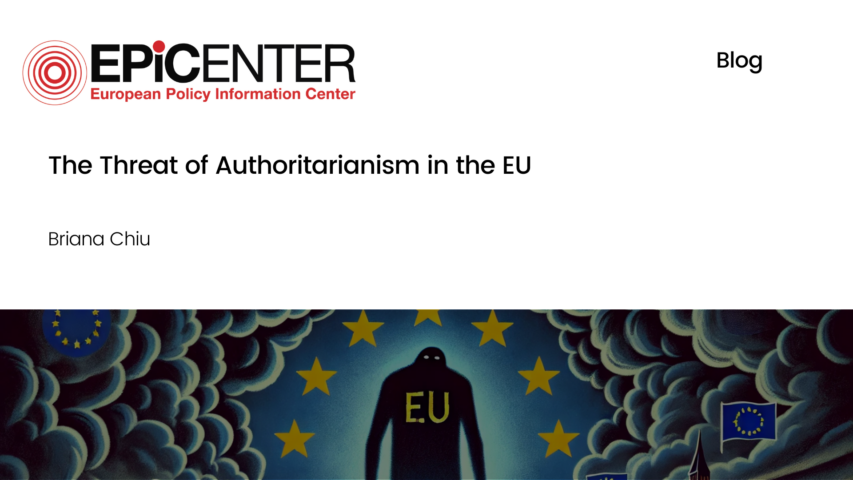The Threat of Authoritarianism in the EU

The Threat of Authoritarianism in the EU
Briana Chui // 25 May 2017
Three of the EU’s most salient values are freedom, democracy, and the rule of law. However, the recent increase in support of authoritarian officials or political movements as a part of the free, democratic procedure seems almost counterproductive to the promotion of those values. Over recent decades, there have been undeniable trends indicating the surge in support for authoritarian parties throughout Europe. These trends raise major questions regarding the rise of authoritarian power yet seem not to provide any solutions.
Since 1980, there has been a significant increase in share of votes for authoritarian parties in elections all across the EU—earning the description of a “pan-European phenomenon” from Timbro. Timbro’s data indicate that Greece, Hungary, and Poland are the three nations with the most voter support for authoritarian parties, and the share of voters for such parties has dramatically swollen over the last 20-25 years.
Even recently, concern over authoritarian sentiment within the Hungarian government has spiked in light of the government’s decision to close the Central European University in Budapest—funded by George Soros whom Hungarian Prime Minister Orbán describes as a “predator”. Other threats to freedom and democracy include the effort to crackdown on non-governmental organisations disguised as an effort towards “transparency.” Given these dangers within the EU, MEPs have begun considering the triggering of Article 7 against Hungary to suspend its voting rights in the European Council. Such sanctions would be a clear and nonpartisan message that the European Union stands for freedom, democracy, and the rule of law over authoritarian power and overwhelming control.
Moreover, it is no surprise that Poland may be the member state to defend Hungary by barring a unanimous vote. Poland, another relatively new EU Member State, has its own recent history of presenting risk to the EU values and with its own potential risk for sanctions and loss of voting rights. For one, Poland has questionably honed in on its own Constitutional Tribunal, and it is no secret that Poland has one of the least free climates for media in Europe. Further, the previously communist nation has refused to cooperate in accepting refugees for fear of the corruption of its homogenous society.
Aside from the risks in Hungary and Poland, the European Commission remains anxious over the abuse of political power in the Czech Republic and will make a statement on such abuse in media on 1 June 2017. While the Czech Republic ranks 47th in the Transparency International’s Corruption Perceptions Index 2016, the European Union must face the issue of overreaching power and abuse in yet another previously communist state in order to maintain freedom and democracy as its priorities.
The rise in support for authoritarian parties is worrisome for more than the current member states, as the European Union has considered Turkey eligible for accession since 1997 and has been negotiating with the nation since 2005. The failed coup d’état of July, 2016 seemed to lead to a major purge within Turkey as over 47,000 were arrested—including over 18,000 police officers and soldiers—between then and April, 2017 as a result to the major threat to President Erdogan’s reign. The results of Turkey’s referendum in April also point towards a narrow majority in support of the consolidation of power to President Erdogan which further discourages opposition and any further attempts of mutiny. As such, even European officials who previously encouraged Turkey’s accession have admitted that the EU cannot allow for such violations of freedom, democracy, and the rule of law.
Augmented power of politicians who already have a threatening amount of authority seems to be misaligned with the European Union’s claimed adherence to fundamental liberal values. But the EU must proceed cautiously with respect to its current member states and potential for future members, as it walks a fine line between effectively facilitating democracy, freedom, and the rule of law and imposing excessive control. For example, amputating Hungary’s voting rights in the European Council seems anti-democratic, but so does the allowance of the member state’s habit of breaching EU law.
As increased support for authoritarian parties throughout Europe is apparent in both left-wing and right-wing parties, a method of effectively combatting the rise in pro-authoritarian sentiment is unclear. What remains clear, however, is that the upward trend in support for these parties shows no sign of ceasing or turning around. For example, Marine Le Pen’s progression to the final round of French elections and the lead shift in such a development as continuous, widespread, and long-lasting as this would likely require more than institutional changes since it is through free, democratic processes that the rise of authoritarian power is evidenced. The culture and the attitude of the people must change. But this can only genuinely happen with the persistence of freedom, and it should come as no surprise that some of the least economically free member states have the highest support for authoritarian parties.
EPICENTER publications and contributions from our member think tanks are designed to promote the discussion of economic issues and the role of markets in solving economic and social problems. As with all EPICENTER publications, the views expressed here are those of the author and not EPICENTER or its member think tanks (which have no corporate view).



